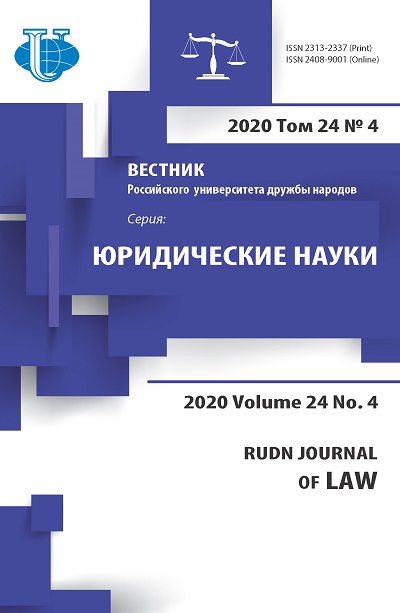THE CONFLICT RULE “LEX POSTERIOR” IN ARMENIAN LAW
- Authors: Ghambaryan A.S.1
-
Affiliations:
- Russian-Armenian University
- Issue: Vol 24, No 4 (2020)
- Pages: 1224-1239
- Section: INTERNATIONAL LAW. FOREIGN LAW
- URL: https://journals.rudn.ru/law/article/view/25261
- DOI: https://doi.org/10.22363/2313-2337-2020-24-4-1224-1239
- ID: 25261
Cite item
Full Text
Abstract
The rule “Lex posterior derogat legi priori” (the later law cancels the earlier one) has a universal doctrinal meaning. The preservation of this principle over the centuries shows its importance and axiomatic character. However, the situation in the Armenian practice is different. This article discusses the legality of the conflict of laws rule of the RA Law “On Normative Legal Acts”, according to which, in the event of a conflict between the earlier and later laws in force, the earlier law applies. The author investigates the conflict rule “Les posterior” from comparative-legal and historical points of view, and concludes that the regulation provided by the RA Law “On Normative Legal Acts” contradicts the laws of dialectics, and axiomatic truths, reflected in Roman law, thus, it is essential to revise it. The philosophical basis of the “new law abolishes the old” rule is the law of the dialectic’s denial of the denial, which gives high authority and value to the “Lex posterior” rule. The rule “Lex posterior” is the means of ensuring the Constitutional freedom of generations. Freedom of generation implies that the new generation is free from the rules established by previous generations and is free to change them. In addition, a law written later must prevail over earlier laws, based on the principle of democracy by the people. Before “Lex posterior derogat legi priori” law is fixed in practice, in case of conflict between the old and the new norms that have equal legal force, the highest Courts of the Republic of Armenia should give preference to the legal norm that came into force later.
About the authors
Artur S. Ghambaryan
Russian-Armenian University
Author for correspondence.
Email: artur.ghambaryan@gmail.com
Doctor of Law, Full Professor, Head of the Department of Theory of Law and Constitutional Law
123 Hovsep Emin str., Yerevan, 0051, ArmeniaReferences
- Akhmetzhanova, С.V. (2017) Legal collisions: theory and practice. Diss… cand. Legal of sciences. Moscow, RUDN Publ. (in Russia).
- Ansel, B., Lequette, Y. (2002) Les grands arrets de la jurisprudence francaise de droit international prive. Dalloz. (in French).
- Bergel, J.L. (2000) Obshchaya teoriya prava. [General theory of law]. Danilenko V.I. (ed.). Translated from French. Moscow, NOTA BENE Publ. (in Russia).
- Bernam, U. (2006) Pravovaya sistema SShA [US legal system]. 3rd ed. Moscow, New justice Publ. (in Russia)
- Ghambaryan, A.S., Dallakjan, L.G. (2019) Kollizionnye normy i ih konkurenciia: monografiia [Conflict Of Law Rules And Their Competition: monograph]. Moscow. Yurlitinform Publ. (in Russian).
- Chashin, A.N. (2018) The Roman doctrine as a form of law in the legal systems of the CIS. Journal of Nizhny Novgorod Academy of the Ministry of Internal Affairs of Russia. 2(42), 77– 81. doi: 10.24411/2078-5356-2018-10012. (in Russian).
- Grimm, D. (2003) Lektsii po dogme rimskogo prava (vosproizvoditsya po pyatomu izdaniyu. C.-Peterburg, 1916 g.) [Lectures on the dogma of Roman law (reproduced from the fifth edition. St. Petersburg, 1916]. Moscow, Zercalo Publ., available at: https://legalns.com/ download/books/lib/roman-law/book-001.pdf (Accessed 05 July 2020). (in Russian).
- Efimov, V.V. (1901) Dogma rimskogo prava: Uchebnyi kurs V.V. Efimova, professora SanktPeterburgskogo universiteta [Dogma of Roman law: Training course V.V. Efimov, professor of St. Petersburg. university]. Saint Petersburg, Bookstore A.F. Zinserling, Mellier and Co. Publ. (in Russian).
- Kofanov, L.L. (2006) Sud i sud'i v izbrannyh fragmentah iz Digest Justiniana [Court and judges in selected passages from the Digest of Justinian]. Translated from Latin. Preface: L.L. Kofanov. Moscow, Statut Publ. (in Russian).
- Korkunov, N.M. (2010) Lektsii po obshchei teorii prava. [Lectures on general theory of law] Sost., avtor vstup. st., komment. A.N. Medushevskii [Compiler, author of introductory article, commentary. A.N. Medushevsky]. Moscow, Russian Political Encyclopedia ROSSPEN Publ. (in Russian).
- Kupeljanc, G. (2007) Resolution of contradictions between earlier and later legal norms in the Republic of Armenia. Yerevan Legality. (39), 49–52. (in Armenian).
- Levin, I.D. (1948) Suverenitet [Sovereignty]. Moscow, Institute of Law of the USSR Academy of Sciences Publ. (in Russian).
- Morandier, L.Ju. (1958) Grazhdanskoe pravo Frantsii [French civil law]. Translated from French. T. 1. Translated from French by E.A. Fleischitz. Moscow, Foreign Literature Publ. (in Russian).
- Petrov, A.A., Tihonravov, E.Ju. (2017) Probely i kollizii v prave. Uchebnoe i nauchnoprakticheskoe posobie [Gaps and conflict in law. Educational and scientific-practical manual]. Moscow, Prospekt Publ. (in Russian).
- Popov, M.V. (2014) Sotsial'naya dialektika [Social dialectics]. Saint Petersburg, Publishing house of the Polytechnic University Publ. (in Russian).
- Regelsberger, F. (1897) Obshhee uchenie o prave [General doctrine of law]. In: Gambarov Y.S. (ed.). Translation by I.A. Bazanov, Moscow, Printing house I.D. Sytin Publ. (in Russian).
- Silchenko, N.V. (2018) Problems of hierarchy of sources of law. State and law, (4), 13–20. (in Russian).
- Shtekgardt, R.A. (1843) Juridicheskaia propedevtika. [Legal propaedeutics]. Translated by F.G. Toll from the 2nd edition. Saint Peterburg, Izdanie knigoprodavca Ju. A. Jungmejstera Publ. (in Russian).
- Vas’kovskii, E.V. (1894) Uchebnik grazhdanskogo prava. Vypusk I: Vvedenie i obshchaya chast'. [Civil law textbook. Issue1: introduction and general part]. Saint-Petersburg, Railway contractor printing house Publ. (in Russia).
- Vlasenko, N.A. (2018) Kollizionnye normy v sovetskom prave: monografija [Conflict of laws rules in Soviet law: monograph], Reprinted. Moscow, Norma Publ. (in Russia).
Supplementary files















